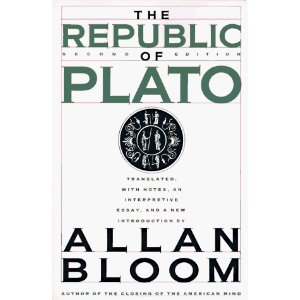The Republic of Plato, translated with notes and an interpretive essay by Allan Bloom, Basic Books, 1968. Second edition: Basic Books, 1991.
Excerpt:
The Republic is the true Apology of Socrates, for only in the Republic does he give an adequate treatment of the theme which was forced on him by Athens’ accusation against him. That theme is the relationship of the philosopher to the political community.
Socrates was accused of doing unjust things—of not believing in the gods which the city believed in and of corrupting the youth. These charges do not relate simply to the man Socrates who happens to be a philosopher but are meant to be a condemnation of the philosophic activity itself—and not on behalf simply of the city of Athens, but on behalf of the political community as such. From the city’s point of view, there seems to be something about the thought and way of life of the philosopher which calls into question the city’s gods, who are the protectors of its laws, and which hence makes him a bad citizen, or rather no citizen at all. Such a man’s presence in the city and his association with the most promising young men make him a subversive. Socrates is unjust not only because he breaks Athens’ laws but also because he apparently does not accept those fundamental beliefs which make civil society possible.
Philosophy required a defense if it was to be admitted into civil society. At the time of Socrates’ trial, philosophy was new to the cities, and it could easily have been crushed. The philosopher had to defend himself before the city, or the city would have been legitimated in discouraging philosophy’s entrance into it as vigorously as possible. Socrates’ trial was the crisis of philosophy, and its life was at stake. And contrary to what modem men might be inclined to believe, it is not simply clear that philosophy is salutary, or even harmless, for the city. Socrates indicates this by the fact that he is at pains in the Apology to distinguish himself from other philosophers. He seems to agree that it is somewhat questionable whether a city which wants its sons to care for it should permit them to consort with philosophers.
The city sees only the apparent atheism of the philosopher and his effect on the young; the poet Aristophanes, who ridiculed Socrates in the Clouds and paved the way for his later official accusation, shows’ why the philosopher is subversive. He depicts Socrates as a man “who has investigated all the things in the air and under the earth and who makes the weaker argument stronger.” The meaning of this charge is that the philosopher studies nature, particularly the heavens, and there he finds a true account of the celestial phenomena differing widely from that given in the religious myths; for example, he learns of a purely mechanical explanation of Zeus’ thunderbolt. The philosopher’s contemplation of the heavens dissolves the perspective of the city, the laws of which now seem to be mere conventions with no natural status. His way of life turns him from the duties of citizenship, and what he learns teaches him to despise the human, political things. What is more, the philosopher’s understanding of the causes of all things makes it impossible for him to grasp man on his own level; man is reduced to nonman, the political to the subpolitical. The philosophers are alienated from the human things, which only poetry can adequately reproduce. The poet, in a more profound way, joins the city in its condemnation of philosophy as an enemy of political man.
Socrates must show, then, that the philosopher is just and that it is he, not the poet, who is the one able to treat of political things responsibly. This is not easy to do since it would appear that the philosopher calls into question the natural character of justice as a virtue and that his science of being has no special place for man in it. The Apology does not adequately accomplish this task, since it is a description of Socrates’ life directed to a large, hostile audience composed of generally ignorant jurors sworn to uphold the defective laws of Athens. The Republic, on the other hand, is a leisurely discussion among cultivated, friendly men. The Apology, in which Socrates defends himself against the charge of injustice, makes no attempt to define justice: his accusers mean by an unjust man one who breaks the laws; and Socrates’ justice is surely not that of a law-abiding man. Only the Republic makes the attempt to define justice and elaborate the science which can give ground to such a definition.
Online:
Google Books
Internet Archive
Amazon

